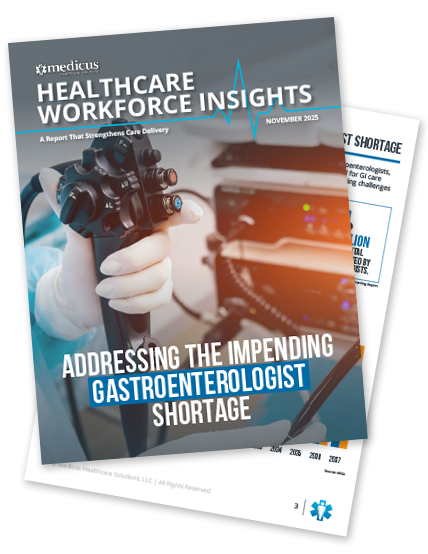Addressing The Impending Gastroenterologist Shortage

By 2037, the U.S. is projected to face a shortfall of approximately 1,390 gastroenterologists, according to the U.S. Health Resources & Services Administration. As demand for GI care continues to outpace the supply of physicians, health systems are facing growing challenges in sustaining timely and equitable access to care.
Download The Complete Gastroenterology Shortage Report Here

Gastroenterology By the Numbers: Workforce & Job Growth Projections
There are over 19,200 gastroenterologists in the United States, with approximately 1,600 specializing in pediatric gastroenterology.

Locum Tenens Gastroenterology: A Look at the Interim Workforce
According to the National Association of Locum Tenens Organizations (NALTO), approximately 52,000 physicians work locum tenens each year. Among gastroenterologists, an estimated 15%* of the workforce has worked locum tenens either alongside their permanent job or as a standalone career.

*Estimates represent a forecast based on Medicus’ proprietary data as of October 2025.
Gastroenterology Hiring Trends: Challenges in Recruitment
Gastroenterology remains one of the most in-demand specialties, yet the available workforce is falling short of operational needs. Many healthcare organizations continue to face difficulties securing gastroenterologists.

With a median of 186 days to fill an open position, gastroenterology vacancies can have significant financial implications. Gastroenterologists are one of five physician specialties that generate 7x their salary in average net annual hospital revenue—an average of roughly $2.9 million per physician annually—making timely recruitment critical for both patient access and system performance.
Key Drivers: Factors Behind the Growing Gastroenterologist Shortage
Geographical Disparities: Widening Care Gaps Across Communities
Significant gaps in gastroenterology coverage persist across the United States. Research published in Gastroenterology reports that 3,149 counties (more than two-thirds) have no practicing gastroenterologist, leaving an estimated 49 million people without access to local specialty care.
Limited Number of GI Fellowship Positions: Delaying Workforce Entry
Although the 2025 Gastroenterology Fellowship Match achieved a 99.6% fill rate, limited training capacity left many qualified applicants unmatched.

Despite gastroenterology fellowship programs expanding by 37 positions, demand continues to outpace available training opportunities, delaying workforce entry.
Actionable Strategies: Overcoming the Gastroenterologist Shortage
Develop GI Hospitalist Models: Strengthening Coordination & Care
Implementing a GI hospitalist model allows hospitals to deliver more timely, coordinated, and cost-effective gastroenterology care.

By dedicating specialists to inpatient services, hospitals can enhance continuity of care, improve patient flow, and free outpatient gastroenterologists to focus on procedural and clinic-based work.
Incorporate Gastroenterology Locum Tenens: Bridging Gaps in Coverage
As the demand for GI care continues to outpace the supply of available gastroenterologists, locum tenens has become a vital solution for maintaining access to care.

Partnering with Medicus provides healthcare leaders with flexible staffing to manage surges, reduce turnover, and sustain service lines while preserving continuity of care and revenue.
For a comprehensive look into the factors driving the impending gastroenterologist shortage and strategies for ensuring continuous access to GI care, we invite you to download our complete report by filling out the form above.
Frequently Asked Questions about the Gastroenterologist Shortage
How Many Gastroenterologists are in the United States?
There are approximately 19,200 gastroenterologists in the United States, with approximately 1,600 specializing in pediatric gastroenterology.
How Many Gastroenterologists Work Locum Tenens?
According to Medicus Proprietary data as of October 2025, roughly 1 in 6 gastroenterologists work locum tenens either in tandem with their permanent job or as a standalone career.
What is Contributing to the Shortage of Gastroenterologists?
There are a multitude of factors contributing to the gastroenterologist shortage, including demographic shifts, geographical disparities, and limited fellowship positions.
Are Gastroenterologists in High Demand?
Yes, gastroenterologists are in high demand as patient needs continue to rise and the workforce remains limited. Each gastroenterologist generates about $2.9 million in annual hospital revenue, highlighting their essential role in patient access and hospital performance.
What States Have the Lowest Number of Gastroenterologists Per Capita?
Nevada, Oklahoma, Montana, North Dakota, and Wyoming have the lowest number of gastroenterologists per capita, with roughly three gastroenterologists for every 100,000 people.


